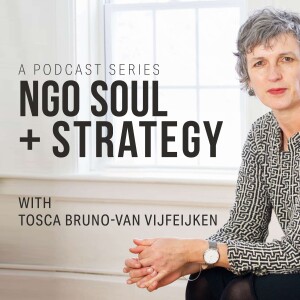
057. From transnational advocacy networks to transscalar activism: Beth Bloodgood & Chris Pallas
 2023-05-21
2023-05-21
Summary
What is ‘transscalar activism’ in a nutshell? And how is it different from what academics call the 'Boomerang' model of international advocacy NGO networks?
When did international NGO advocacy begin attracting the attention of academics, and why? What had shifted at that point, what had changed?
What was the dominant narrative in academia for a long time? And what was wrong with that?
In this NGO Soul+Strategy podcast episode, I interview Elizabeth Bloodgood, Associate Professor at Concordia University, Canada, and Christopher Pallas, Professor at Kennesaw University, USA, on major shifts in advocacy and campaigning approaches among NGOs. Trust me: their empirical research, based on practitioner case studies, is relevant for us practitioners.
Elizabeth’s Bio:
- Associate Professor at Concordia University in Montreal, Quebec, Canada
- Lecturer in non-state actors at the University of Pennsylvania, USA
- Assistant Professor at Dartmouth College, USA
Christopher’s Bio:
- Professor of Conflict Management at the Department of Political Science and International Affairs at Kennesaw University in Georgia, USA
- His research focuses on nongovernmental organizations and their role in international policymaking and development
We discuss:
- Chris and Beth argue that how we think about advocacy strategies in relation to the roles and practices of global North and global south founded NGOs is well overdue for an update
- The argument they make in their 2022 book ‘Beyond the Boomerang: From Transnational Advocacy Networks to Transscalar Advoacy’ is linked to hot topics of today, such as decolonizing aid, and a shift in power and agency between global South-founded and global North-founded NGOs – a shift that Beth and Chris argue has already been well on its way for 10+ year.
- The era of the so-called ‘boomerang effect’ model in global advocacy -- in which national-level global South-founded NGOs would link up to global North-founded NGOs on advocacy causes when they did not find their government to be responsive -- that era is over
- Their argument as expressed in the book implies changes in what are legitimate, needed roles for global North-founded NGOs into the future.
- National NGOs in the global South now choose at what scale to operate (thus the term ‘transscalar activism’) – whether local, national, regional or global -- and these days ally with Southern CSOs as much as with global North-founded NGOs
- This also means that we should expect to see that global South-founded NGOs will feel less obliged to engage in marketing and reframing of their local causes in order to get international partners or global-North based media on their side.
Resources:
Elizabeth’s LinkedIn Profile
Faculty page of Elizabeth
Faculty page of Christopher
Christopher’s Google Scholer page
Book:
More Episodes
Create your
podcast in
minutes
- Full-featured podcast site
- Unlimited storage and bandwidth
- Comprehensive podcast stats
- Distribute to Apple Podcasts, Spotify, and more
- Make money with your podcast
It is Free
- Privacy Policy
- Cookie Policy
- Terms of Use
- Consent Preferences
- Copyright © 2015-2024 Podbean.com





